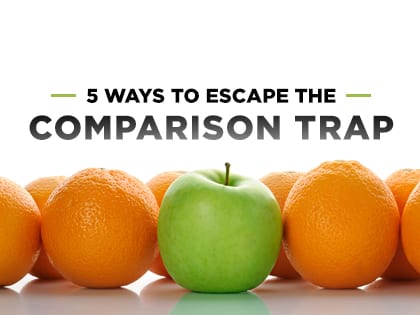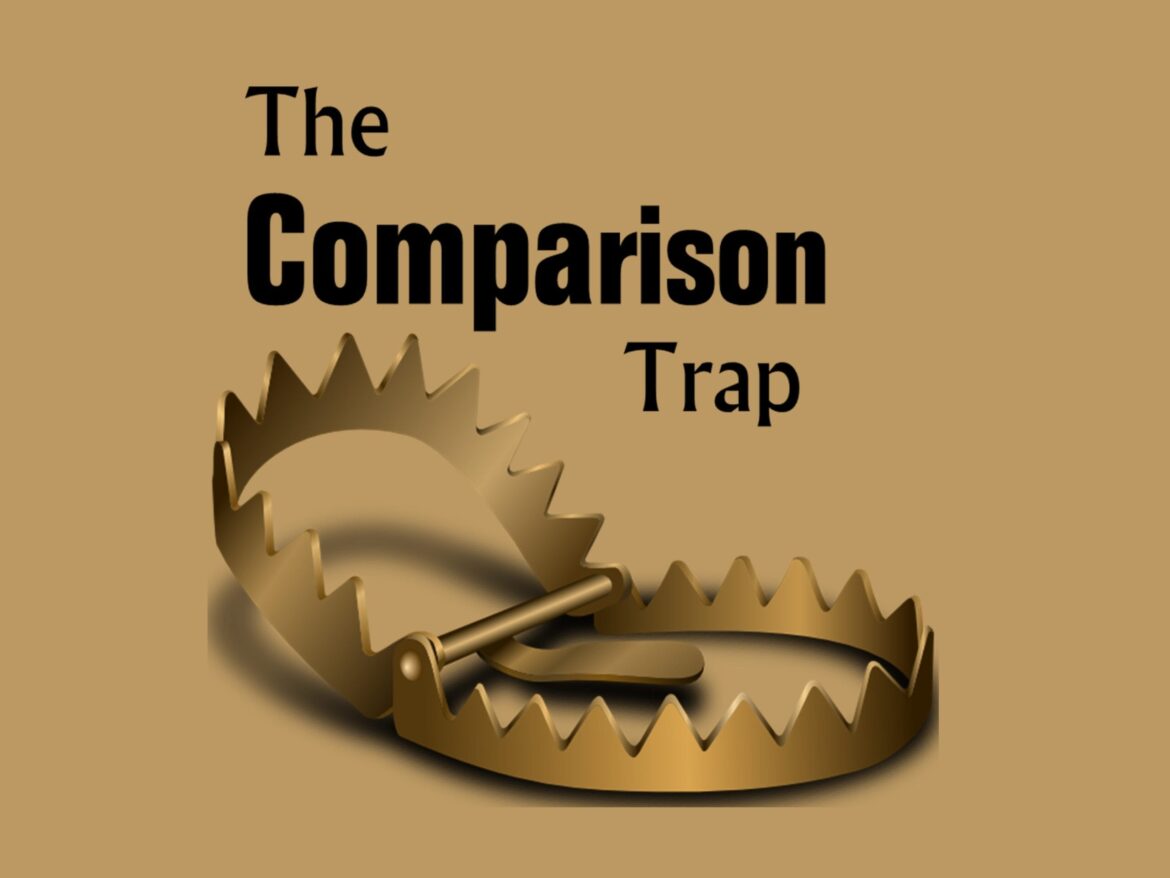People often struggle with comparison. To determine if we are okay, not okay, or truly not okay, we look to people around us. Maybe we felt alright until we noticed the stunning addition someone had made to their house or the all-inclusive trip they were talking about on Facebook or Instagram.
For some of us, more than others, we do it every day. Yes, the never-ending comparison between your life and what you see on TV, in publications, on social media, in person, and in the news. It’s the incessant thinking like “I wish I was as successful as him” or “I wish I could look like her.” All of these unrestrained comparisons do nothing but make you feel envious and less confident in yourself. The majority of comparisons are thought to be risky. Comparing things that encourage you to improve your life is the only thing that is deemed healthy. Apart from that, the majority of comparisons are detrimental to our mental well-being.
I’m hoping I’m not the only one who remembers this scenario: I sit at a table with friends and listen to them talk about their wonderful life adventures and career promotions. Though I’m happy and proud of my friends’ achievements, I can’t help but contrast my life with theirs. With years of practice, it has become nearly an automatic behavior. My comparison starts off peacefully with similarities, but it soon veers into a more dangerous high tide of comparisons when I start making unfavorable comparisons between the things in their lives and the things I lack in mine. The ideas that “I should be further advanced in my profession,” “I should be doing this,” “I should be doing that,” and so forth start to creep in. I have ventured into the “Sea of Shoulds,” an erratic location akin to the Bermuda Triangle, from which very few people escape unharmed.
It begins when we are young and start to become more self-aware and start noticing the similarities and differences between us and other people. It’s common to assess how you stack up against others in several facets of your life and identity. Since it was essential to “fit in” during Neanderthal times, it is ingrained in our genetic makeup. If it weren’t, we would have been banished from the cave and would have been vulnerable to the actual threats of the world at the time, which would have resulted in death.
Regretfully, drawing comparisons might set off a vicious cycle of negative thoughts and self-perceptions. Even in educational settings, we are frequently graded and contrasted with other exam takers based on our GPA or task completion performance. It could make someone feel as though they’ll never measure up or be good enough. These items are easily replaced with “grown-up” equivalents as adults, such as money, material belongings, and so forth. Ironically, because they were raised to rely on other people’s approval and the ego boost that comes with being “first” or “the best,” the most popular kids on the block are probably also the ones who need to compare themselves the most as adults.

The social comparison hypothesis was initially proposed by psychologist Leon Festinger in 1954. According to Festinger, we compare things in order to assess ourselves. The impulse is fundamentally linked to the snap decisions we make about other people, which are an important part of the brain’s social-cognition network and have their roots in the evolutionary need to defend oneself and recognize threats. Since comparison is a fundamental human impulse, there’s really no way of shutting it down completely. But if we understand its origins, mechanisms, and what to watch out for, we may be able to mitigate the negative effects and amplify the good—both online and off.
The Dangers of Comparison:
- Comparing Yourself is a Roller-Coaster Ride: When you compare yourself, the thoughts, deeds, and opinions of other people get to throw your sense of worth about. The strength you acquire is only a transient ego boost, even when you do feel superior to others in comparison. When the ego boost wears off, which it eventually will, your fears come back and you become desperate for validation from others. At that point, the roller coaster ride begins anew.
- The Debilitating Need for Approval: You’ll probably discover that you too seek other people’s favor if you compare yourself to them. When you crave other people’s approval, you start to doubt your own judgment and your choices. You lose all sense of self in it, and you never really know who you are or what you truly want.
- Comparing Yourself Fuels Your Insecurities: Comparing oneself to others leads to the persistent feelings of inadequacy, jealousy, wanting other people’s praise, and not being good enough. If other people’s accomplishments determine your “good,” you’ll never feel quite good enough. If your self-acceptance is based on the thoughts, statements, or deeds of others, you will never be able to fully approve of yourself. When someone else succeeds more than you have, in your eyes, and in that sense, they are better than you, you can never truly be happy for them. When your weaknesses are measured against the strengths of others, it is impossible to truly appreciate their accomplishments.
Given that evaluating oneself against others is a senseless and detrimental activity, the natural inquiry that follows is how to put an end to it. The first step is to admit that you compare yourself to other people. Even though it can seem apparent, if you deny something’s existence, you cannot make any changes to it.
Tips For Dealing with Comparison
- Seek Connection, Not Comparison
“Limit time on social media, but more important is how that time is used,” says Mitch Prinstein, a psychologist at the University of North Carolina. Instead of passive scrolling, send private messages, talk about shared experiences, seek genuine emotional connection, and use social media in general to “foster the kind of relationships known to be valuable offline.”
- Look Up, Just a Little
Decades of research suggest that upward comparison can provoke motivation and effort; children who compare themselves to peers who slightly outperform them have produced higher grades, for instance. Seeing that the path to improvement is attainable is key—you’re better off comparing yourself to someone a rung or two above you than to someone at the very top of the ladder.
- Count Your Blessings
If you focus on the good things in your life, you’re less likely to obsess about what you lack. Loretta Breuning, the author of Habits of a Happy Brain, recommends engaging in “conscious downward comparison.” For instance, Breuning says, compare yourself to your ancestors. “You don’t have to drink water full of microbes. You don’t have to tolerate violence on a daily basis. It’ll remind you that despite some frustrations, you have a fabulous life.”
- Compare Yourself to…Yourself
Like the tendency among older people to measure themselves against their own past, Sonja Lyubormirsky, a psychologist at the University of California, Riverside and the author of The How of Happiness notes that “people who are happy use themselves for internal evaluation.” It’s not that they don’t notice upward comparisons, she says, but they don’t let that affect their self-esteem, and they stay focused on their own improvement. “A happy runner compares himself to his last run, not to others who are faster.”
- Pursue Upward-Joy
Based on his own Buddhist practice, San Francisco psychiatrist Ravi Chandra recommends using the social comparison impulse as a springboard for true self-growth. He recounts his own effort to do so in a new book, Facebuddha: Transcendence in the Age of Social Networks! “Instead of generating envy, which is a form of hostility, explore what you admire and appreciate about other people and cultivate joy for their success,” Chandra says. “It can be a catalyst for personal growth.”
Comparisons can go hand and hand with depression and anxiety. If you find yourself stuck in a cycle of comparison and using it to fuel negative thoughts and feelings, I would encourage you to work with a professional on returning to a focus on your true self and your strengths.
Take away
Social media is like kerosene poured on the flame of social comparison, dramatically increasing the information about people that we’re exposed to and forcing our minds to assess. In the past, we absorbed others’ triumphs sporadically—the alumni bulletin would report a former classmate having made partner at the law firm or a neighbor would mention that his kid got into University. Now such news is at our fingertips constantly, updating us about a greater range of people than we previously tracked, and we invite its sepia-filtered jolts of information into our commutes, our moments waiting in line for commuters omnibuses, even our beds at 2 A.M.
The tendency to check social media in our downtime, when we’re more likely to be self-reflective, can make for some ugly juxtapositions. You see someone tweet about his fabulous new job while you’re eating another sad desk salad, or you gaze upon pictures of an acquaintance grinning beside her sexy boyfriend while you stew over a fight with your spouse. Moreover, social media seems to ascribe explicit valuations to people in ways that once seemed more vague. The number of (X) Twitter followers, Instagram hearts, LinkedIn connections, or Facebook likes that another person garners compared to us can feel like rock-solid proof of position on some imagined ladder.
There’s a reason that teenagers in particular are prone to the feverish pursuit of valuation via social media. Prinstein says it’s because the wide variety of regions in the brain that seek and deliver social rewards, including the part of the striatum called the nucleus accumbens, become supercharged at the adolescent transition. “Social rewards are basically activation of dopamine within the brain when we feel we’re getting attention or positive feedback from peers,” Prinstein says. “It can also come from comparing yourself to others, especially highly valued others, and seeing that you agree with them, they agree with you, or that you’re similar to them. It activates parts of the brain not unlike the way a drug does, which may be why adolescents become truly addicted to social media.”
Most adults who grew up prior to the age of social media can recall having experienced the same innate drive for peer attention as teenagers. It’s part of a natural process of reflected appraisal, wherein we develop a sense of who we are from how others view us. “That hypervigilance about how others see you is supposed to go away in adulthood,” says Prinstein. “But social media has created this lifelong adolescence. It makes it too easy to keep making comparisons in a very adolescent way.”



2 comments
Your article helped me a lot, is there any more related content? Thanks!
Thanks for sharing. I read many of your blog posts, cool, your blog is very good.